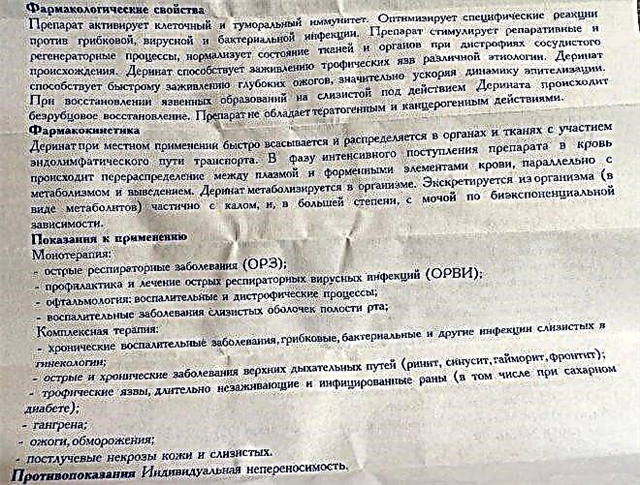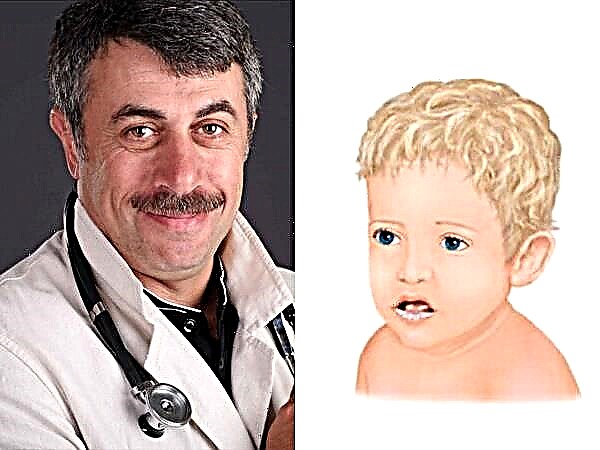
SARS or colds are quite common problems of the autumn-winter season in childhood. Therefore, before the cold season, drugs that can strengthen the immunity of a son or daughter are in high demand among parents. Derinat can be called one of them. How does such a medicine work on a child's body, how is it applied correctly and is it able to prevent infection with the flu?

Release form
Derinat is a transparent liquid without color, any smell or taste.
It comes in the following variants:
- Nasal drops. This is 10 ml of solution placed in a dropper bottle.
- Spray. It also contains 10 ml of medicine, and the package has a special spray nozzle.
- Ampoules. This form is intended for intramuscular injection. One ampoule can contain 2 ml or 5 ml of the drug, and one pack contains 5 or 10 ampoules.
Composition
In all forms of Derinat, sodium deoxyribonucleinate is the substance providing a therapeutic effect. In the medicine for local use, nasal drops and spray, its concentration is 2.5 mg per 1 ml, that is, it is a 2.5% solution.
Ampoules contain a more concentrated liquid - each milliliter contains 15 mg of the active compound. Additional ingredients of all types of Derinat are the same. It's just sodium chloride and sterile water. There are no other chemical additives inside the solution.

Operating principle
Deoxyribonucleinate has an immunomodulatory effect, since the use of Derinat activates the cells of the immune system and stimulates the production of humoral immunity factors.
Although the medication does not directly affect pathological agents, it helps to quickly get rid of viruses, bacteria or fungi by acting on the immune response.
Another property of Derinat is the ability to stimulate tissue regeneration. This action allows you to use the medication for stomatitis, conjunctivitis, burns, infected wounds, trophic skin lesions and other problems. Local treatment with a solution activates healing and epithelialization, therefore the drug is used by surgeons and ophthalmologists.
When injected, Derinat not only makes the body more resistant to infectious agents, but also affects the formation of blood cells and improves the functioning of the lymphatic system. In addition, the injections help to desensitize the patient's body to radiation therapy or chemotherapy.

Indications
Most often, Derinat spray and drops are prescribed for influenza or acute respiratory viral infections, as well as for prophylactic purposes, in order to protect the child from colds and viral lesions of the nasopharynx. In such cases, the medication can be used alone as monotherapy.
Other reasons to prescribe the drug are:
- Inflammatory diseases of the respiratory tract, such as otitis media, pharyngitis, tonsillitis, or adenoiditis. With such pathologies, Derinat is often used as one of the drugs of complex treatment, supplementing this with antibiotics, antiviral agents, antipyretics and other medicines.
- Stomatitis, gingivitis and other oral lesions. With these pathologies, rinses or local treatment with a spray are prescribed.
- Ophthalmic diseases occurring with a dystrophic or inflammatory process. With conjunctivitis, barley and other diseases, drops are usually prescribed.
- Burns, infected wounds, trophic ulcers, the effects of frostbite and other skin damage. In their treatment, local treatment with a solution and gauze dressings are used.
- Prolonged rhinitis, adenoids, bronchial asthma, hay fever and similar diseases. Therapy for such pathologies may include inhalation with Derinat.
- Radiation damage, resistance to cytostatics, lung disease, sepsis and other serious pathologies. Such diagnoses require an injection of the drug.


At what age is it assigned?
Derinat can be used at any age - both in babies up to a year (for example, at 10 months), and in schoolchildren or adolescents. At the same time, for children under 3 years of age, the medication is prescribed only in the form of drops, since it is more convenient to use such a remedy at an early age. The spray is prescribed for older children who can hold their breath and follow the instructions of an adult.

Contraindications
Derinat is not used in children with intolerance to the components of such a drug. The solution has no other contraindications, except for allergies.
Side effects
Patients generally tolerate the drug well. Nasal drops do not provoke vasoconstriction in children, and also do not cause negative effects from the gastrointestinal tract or the nervous system. For open wounds and burns, topical application of the drug additionally has an analgesic effect. One of the side effects of Derinat's injections in diabetes mellitus is the hypoglycemic effect.


Instructions for use
- Derinat drops are injected into the child's nasal passages after they have been cleaned using cotton cords or an aspirator. If the drug is stored in the refrigerator, then first you need to warm it up a little (hold it in your palms), and only then drip or inject it into the nose.
- For colds and flu in the first 2 days of illness, the medicine is used every 1-2 hours. A single dosage will be 2 drops or 1-2 injections. On the third day of illness, the medication is started to be used 3-4 times during the day. The dose for one application remains the same, and the duration of treatment is determined individually (until recovery).
- In the complex treatment of sinusitis, rhinitis and other diseases, Derinat is administered 3-5 drops or 1-2 sprays into each nostril. The medicine is used four to six times a day for 7-15 days.
- Rinsing the mucous membrane of the mouth and throat is carried out 4-6 times a day, using 1 / 2-1 bottle of drops for one procedure. The duration of treatment is 5-10 days. If a spray is prescribed for such a treatment of the oral cavity or throat, then 2-3 clicks on the spray are used, directing it to the damaged area.
- In the eyes of Derinat, 1-2 drops are dripped 2-3 times a day. Ophthalmologists prescribe this therapy for 2-6 weeks.
- For the prevention of acute respiratory infections, the medication is prescribed three or four times for 1-2 weeks, although the medication can be dripped throughout the cold season. A single dosage is either 2 drops or 1 spray of a spray.
- Gauze for application dressings in the treatment of skin lesions is moistened with a solution 3-4 times a day. If a spray is used, it is sprayed 4-5 times a day until healing.
- If the child is prescribed inhalations with a nebulizer, then 1-2 ml of Derinat is used for one procedure, mixing them with 1-2 ml of saline. Inhalation is carried out 2 times a day, and the entire course of such treatment lasts from 5 to 10 days.
- Intramuscularly the drug is prescribed in a single dose of 0.5 ml for children under 2 years of age and 5 ml for children over 10 years of age. If the child is between 2 and 10 years old, the dosage is calculated by multiplying 0.5 ml by the number of years. The course of treatment is up to 5 injections.

Overdose
Cases when a high dose of the solution had a toxic effect have not yet been recorded.
Interaction with other drugs
Derinat is well combined with antipyretic, antibacterial, antiviral and other medicines, therefore it is often prescribed in combination with these drugs to enhance their effect. When used topically, it is important to remember that Derinat is incompatible with fatty ointments and hydrogen peroxide.

Terms of sale
All forms of Derinat for external use are non-prescription drugs, so it is not difficult to get them at the pharmacy. On average, the price of a bottle of drops or spray is 250-350 rubles. The medication in injectable form is sold by prescription and costs about 2,000 rubles for a package of 5 ampoules of 5 ml.

Storage
For storing Derinat at home, a refrigerator is best suited, since the manufacturer calls the optimal temperature range from +4 to +20 degrees. The shelf life of any form of the drug is 5 years. If the medication has not yet been opened, it can be stored out of the reach of babies until the date indicated on the box.
However, after opening, the solution is suitable for only 2 weeks, because there are no preservatives in its composition. If after the first use 14 days have passed, and there is still liquid inside the bottle, it will have to be discarded. It is not recommended to continue treatment with such a medication.

Reviews
Derinat is in demand among mothers, and many parents speak well of this medication. They emphasize that after a course of such a drug, the child either does not become infected with the flu, or suffers the disease in a milder form. The advantages of drugs are called ease of use and the ability to use at any age. But the short shelf life and the need to keep the bottle in the refrigerator are attributed to the disadvantages of the medication. In addition, there are also references to the lack of a therapeutic effect.

Analogs
To replace Derinat, other drugs can be used that can strengthen the immune system of children, for example:
- Nasal spray IRS-19. It includes bacterial lysates and is prescribed for babies over 3 months old. For children over 3 years old, Imudon lozenges can be given instead. They also contain lysates of microorganisms, so this medication can be taken for stomatitis, tonsillitis and other diseases.
- Gel Viferon. This interferon-based medicine can lubricate the nasal mucosa of the baby from birth. The drug is also represented by rectal suppositories (used from birth) and ointment (prescribed at 1 year and older).
- Grippferon nose drops. This medication also includes interferon and is allowed at any age. It is also produced in the form of a spray.
- Coated tablets Cycloferon. Their active substance is able to stimulate the production of interferon, so the drug is in demand for acute respiratory viral infections and influenza. It is prescribed for children 4 years of age and older.
In addition, depending on the symptoms of the disease or the state of the child's immunity, the pediatrician may recommend other drugs (for example, Vibrocil or Aqua-Maris for nasal congestion), so it is best to select an analogue together with a specialist.


In the next short video, Dr. Komarovsky tells what needs to be done to increase the child's immunity.



